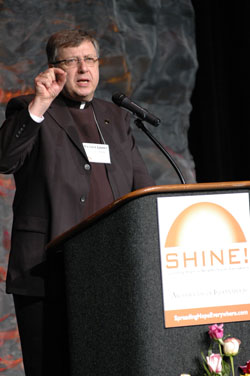Head of Catholic Charities USA gives parishes advice for fighting poverty

Father Larry Snyder, president of Catholic Charities USA, delivers his keynote address at the “Spreading Hope in Neighborhoods Everywhere” conference on Oct. 1 in Indianapolis. (Photo by Mary Ann Wyand)
By Brandon A. Evans
As the president of Catholic Charities USA, Father Larry Snyder has had the opportunity to travel all over the country to see the work being done to fight poverty.
Programs in parishes and dioceses have “created a whole lot of hope in people’s lives,” he said.
Last year, Catholic Charities cumulatively served 85 million people in need, using 70,000 staff members and $4 billion.
Father Snyder shared those figures during his Oct. 1 keynote address at lunch of the kickoff conference for a yearlong social ministry renewal in the archdiocese that is known as SHINE—“Spreading Hope in Neighborhoods Everywhere.”
Catholic Charities officials take poverty seriously, he said, refusing to take a Band-Aid approach to the nearly 40 million people who live in poverty.
“In my mind, the primary focus of social ministry is the parish,” he said. There, God’s presence can become tangible to a world hungry for his love.
Still, Father Snyder said, “a parish can’t do everything. Catholic Charities can’t do everything.”
So what can a parish do to respond to the need around it?
He said a parish should find what its community needs, discern what its members are interested in doing, and factor in what kind of budget and resources it has.
Among the tools he suggested for parishes: looking at census data and talking to community experts; surveying parishioners for interest and reflecting on the values of our Catholic faith; analyzing the time, talent and treasure of the parish; and thinking about partners to team up with in the community.
“You’re not alone in doing this,” he reminded the people assembled in Lucas Oil Stadium in Indianapolis from parishes, schools, agencies and institutions around central and southern Indiana.
Every challenge is an opportunity, he said. The recent economic crisis has given us the opportunity to make poverty “unacceptable” in the United States.
Will we take this opportunity and act? Father Snyder asked. “We know we should do something about poverty in this country.”
After the keynote address, Father Michael O’Mara, the pastor of St. Mary Parish in downtown Indianapolis, said “Father Snyder put before us some very startling statistics, and I think any time that we hear statistics like that—nearly 39 million of us are living in poverty in this country—it is a reminder to us of our need to respond.”
Father O’Mara said Latino parishioners especially struggle with low wages yet still send part of their meager income to family members living in developing countries.
“Father Snyder spoke of the [federal] poverty level being now classified as $22,000 a year in this country,” Father O’Mara said. “So many of our Latin American immigrants are earning below the poverty level, and are trying to sustain themselves here in this country.
“… Many of them send money home to support their own families,” he said. “In this tough economic time, this is a big struggle for them. The minimum wage in Mexico is between 500 and 600 pesos a week. That would be equivalent to $48 to $55 a week. Nobody can live on that income.”
St. Mary parishioners are “very socially aware,” he said. “Part of that comes from the Latino community that is a part of our parish. We live in an area that experiences a lot of poverty. We are constantly in the midst of our homeless. Just last night, I counted three people sleeping on the front porch [of the rectory], one person on the back porch and two people underneath trees on the parish property. We see it day in and day out.”
(Mary Ann Wyand, senior reporter, contributed to this story.) †
